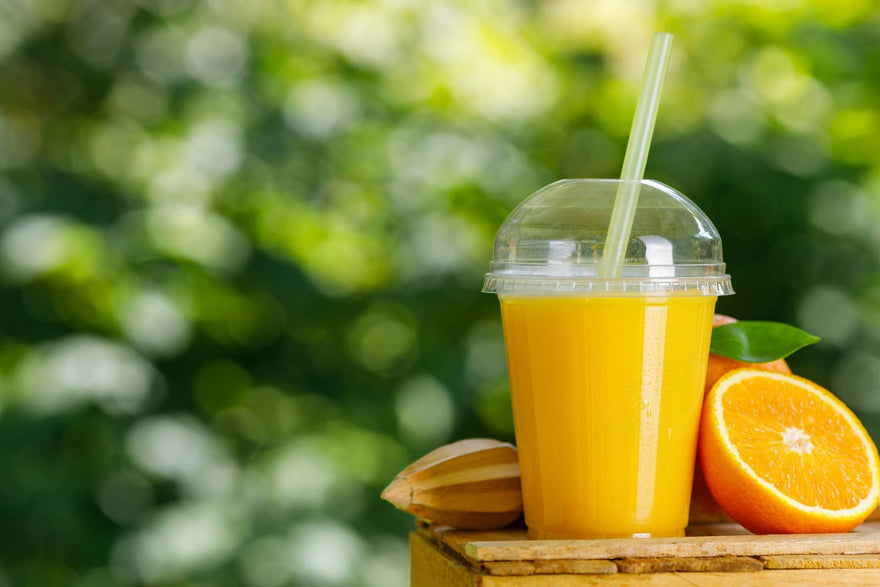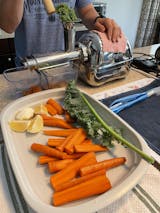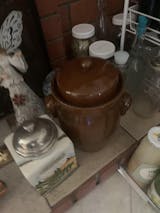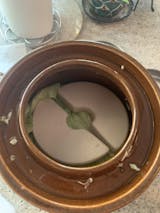I am completely satisfied with my Mockmill 100. It feels substantial, processes grain quickly, and is fairly quiet. I was very satisfied with the customer service I received from Extreme Wellness. I knew the mill was backordered when I put in my order. I was kept updated on the status weekly. They even answered a question I had over the weekend. I would definitely order from them again.
If you are looking for the best juicer you can get you no further this is those for you.
Diamant grain mill was by far the most difficult item to actually get that I’ve ever ordered. Over a year from my initial purchase. Originally ordered Christmas Day 2021. After five month I decided to give up and order a mill from the US that didn’t have the supply chain issues. Several months past before my “ wants” got the best of me. I knew I liked the look and durability of Diamant. I reordered in August. This time Extreme Wellness sent out updates on arrival dates. I received this beautiful mill around the first week of February. The mill arrived with a few chips in the enamel paint. I reported this to Extreme Wellness. I received an email immediately wishing to resolve the issue. They checked the manufacture in Europe to find out they are going to send touch up paint. I am very happy with this purchase as it not only will be the most durable piece of kitchen equipment I’ve purchased but also the most beautiful. Presently I am building a table to permanently mount it to for use and display. Thanks Extreme Wellness for being diligent with the manufacture and patient with me when I would call for a status update.
The grain mill is awesome. Very quiet. It took a few months to get but I can't blame the company for the backlog for the product. It wasn't available anywhere. Plus I got a coupon for using extreme wellness supply. If you are curious about the size, it's smaller than my vitamix. Check out the photo for a comparison.
I recently purchased a Super Angel Pro Juicer model 7500. I am juicing about 10-12 quart of juice every week. I used all sorts of green leaf vegetable (Kale, Chard, Collard green, Mustard Green, Spinach, Fennel, Boc Choy, Coriander and Parsley), Green Apple, carrots, Lemon, Ginger, fresh turmeric etc. Before that I used a centrifugal juicer. I thought Angel will be slower. To my surprise Angel was much quicker and saved me about a third of time. My juice yield is also about 15-20% higher. I did use a cloth to manually squeeze more juice from pulp when I was using centrifugal juicer. With Angel juice also tastes much better. So far I am super happy with this juicer. It is much easy to clean compared to my centrifugal juicer. I hope it continues to work this way.
Apr 14, 2024 update - I have been using this juicer for 2.5 years now. I make about 10-quart mixed vegetable juice every about 10 days. It does take about 4 hours, but juice comes out very good. I had no issues with the juicer except it does get heated up sometimes and requires a short break. There are some small deposits on the perforated sieve and gears. Some of the leafy vegetable produce lots of foam which I solve by adding some of the fibrous waste back in the hopper to absorb the foam. Also, some soft fruits, like green apple or lemons cause a similar issue requiring adding fiber back to help gears pushout the things.
I've been using K&K crocks for years to make sauerkraut - they never cease to amaze! Best quality I've ever seen - and dishwasher safe! Perfect all around!
This grain mill is esthetically pleasing to the eye to keep on your kitchen counter and the grinding of the grains is next level with the stones! Our family is so pleased with this purchase.
I've been using a Champion as well as a manual "healthy juicer" for greens for many years. After seeing a you-tube video on the VSJ843 I decided to buy one. I just love it! It does a very good job of juicing hard veges, fruit and greens. The juicing session is a lot faster using the VSJ843 compared to using and cleaning two machines. It's quiet, has a small footprint and looks good on my counter. It's not messy to use and clean up is a breeze. You do need to chop up your produce into small pieces to get the best results. Oh, and customer service from Extreme Wellness is outstanding.
Not only is the juicer more than I could have hoped for. Easy to assemble, use, and clean; the Super Angel is a high yield cold press juicer. I juice on Sundays and is keeps in my glass bottles for the week. Worth the investment.
*Edit - I have been using weekly for over four years. Great high volume juicer. This is built to last























